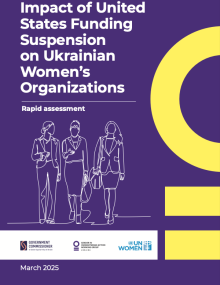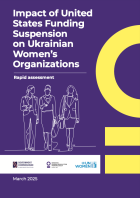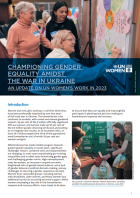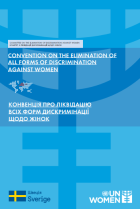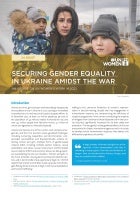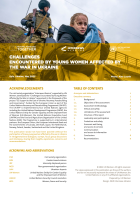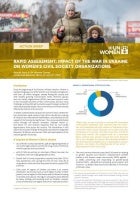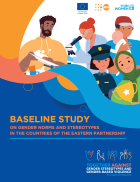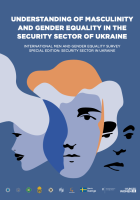1 - 20 of 32 Results
Pagination
Date:
Women-led and women’s rights organizations (WROs) in Ukraine have been severely impacted by funding suspensions by the United States (U.S), a new survey by UN Women, the Apparatus of the Government Commissioner for Gender Equality Policy of Ukraine, and the Gender in Humanitarian Action Working Group, reveals.
UN Women calls for more direct, flexible, and long-term funding to women’s rights organizations to ensure life-saving programs for women and girls to meet sudden funding gaps.
Date:
Women and men, girls and boys, in all their diversities, have been profoundly impacted by over two years of full-scale war in Ukraine. The humanitarian crisis continues to escalate, with varied and uneven gendered impacts. 56 per cent of the 3.7 million officially registered IDPs are women, and women make up 93 per cent of the 4.6 million people returning to Ukraine and seeking to re-integrate into society. As of December 2023, at least 14.5 million people (one-third of the population) need humanitarian aid, of which 56 per cent are women and girls.
Date:
Policy Brief: A Gender Responsive Recovery for Ukraine: Introduction
Date:
The Concluding Observations include recommendations to Ukraine to enhance implementation and protection of the rights of women and girls, including living in affected by war in Ukraine areas and internally displaced women, access to justice, education, health care, employment, economic and social benefits.
Date:
Women and men, girls and boys have been deeply impacted by the escalation of war in Ukraine in 2022, causing an immediate humanitarian crisis and massive disruption to peace efforts. Ukraine has become one of the world’s most complex emergencies, and the crisis presents severe gendered challenges, including worsening inequalities and discrimination, compounded vulnerabilities and disproportionate violence affecting women and girls.
Date:
This study generates research and evidence on needs and priorities of young women affected by war broken out as a result of the Russian full-scale invasion of Ukraine on 24 February 2022. It is aimed at facilitating advocacy initiatives for young women to voice their concerns and demands. The study is developed by UN Women Ukraine together with NGO Internews Ukraine.
Date:
The Rapid Gender Analysis seeks to draw attention to the gender dynamics in the war in Ukraine—both preexisting and emerging—and draws out recommendations for humanitarian leadership, actors and donors to ensure consideration of the gendered dimensions of risk, vulnerability and capabilities in response and preparedness to this crisis.
Date:
Since the beginning of the Russian military invasion in Ukraine, women’s groups and civil society organizations have been quick to react to the immediate priorities of their communities, but face many challenges as they attempt to provide support to large numbers of internally displaced people, host-communities and those directly affected by violence and insecurity. UN Women has conducted a rapid survey to help inform the decision-making of national and international stakeholders, and advocate for the support of civil society during the war.
Date:
This publication presents data and insights about the perceptions of male and female roles in society, employment and leadership, household and family, gender-based violence, sexual relationships and reproductive health in the Eastern Partnership countries and provides recommendations for future programming.
Date:
The first-ever International Men and Gender Equality Survey (IMAGES) in Ukraine’s security sector was conducted by UN Women Ukraine and Promundo-US from February 2019 to December 2020 at the initiative of the Ministry of Internal Affairs of Ukraine to explore gender and masculinity within the Ukrainian security sector to further inform the development of policies that promote gender equality in the agencies of the Ministry of Internal Affairs of Ukraine.
Date:
The Guidelines highlight fundamental theory and instructional techniques for integrating gender approaches into the educational process of higher education institutions in Ukraine’s security and defense sector; cover the essence, structure, content, forms and methods of gender component implementation in various daily activities; offer a unified approach to gender equality and provides useful practical recommendations for teachers, specialists, scientists and a wide range of experts in the security and defense sector.
Date:
This report on the proceedings of the global conference “Gender-inclusive peace processes: Strengthening women’s meaningful participation through constituency building” explores current challenges, best practices, and recommendations on how best to leverage the practice of constituency building to further gender-inclusive peace.
Date:
The research looks into how the implementation of good practices on community policing could contribute to prevention and elimination of violence against women and girls at the community level. This publication also provides recommendations to the Ministry of Internal Affairs of Ukraine and National Police of Ukraine on community policing and prevention violence against women and girls.
Date:
The findings of the assessment reveal inter alia a very low number of protection orders issued in the conflict-affected Donetsk and Luhansk regions of Ukraine. This points out to low awareness of survivors of domestic violence about this protection mechanism, as well as poor quality of the legal advice received in such cases. Additionally, the assessment results show that there is a high burden of proof imposed on survivors and that children witnesses of domestic violence are rarely recognized as victims of domestic violence.
Date:
The UN Development Programme in collaboration with UN Women and UN Food and Agriculture Organization led the socio-economic assessment of the impact on businesses and households in Ukraine. This report presents an assessment of the social and economic impacts of the COVID-19 crisis on Ukraine, with a focus on those groups which are, or have become vulnerable due to the pandemic, as well as the impact on micro, small and medium enterprises.
Date:
The spread of the COVID-19 pandemic and the related restrictive measures exposes all groups of women to higher risks of losing incomes and savings, it significantly increases the burden of unpaid care work, exposes women and children to domestic violence and exacerbates vulnerabilities of those facing multiple forms of discrimination, reveals the new study developed by UN Women Ukraine.
Date:
Following the principle "Nothing about us, without us," this study aims to better understand the capacity of women's organisations in Ukraine as the first step to improving assistance on the promotion of gender equality and women's empowerment. It is designed to create a baseline against which to measure future capacity development efforts. These findings can be used by the civil society, the government stakeholders and the donor community in their planning, coordination and capacity building initiatives.
Date:
The evaluation looks into the gender responsiveness and impact of policy design, implementation and monitoring and reviews alignment with the national policies promoting gender equality. The findings of the evaluation lessons will inform the development of the next post-2020 Roma strategy and action plan in accordance with the European and international standards, as well as the relevant national legal and policy frameworks, particularly those on human rights and gender equality.
Date:
‘Invisible Battalion 2.0’: Women Veterans Returning to Peaceful Life” is a participatory and evidence-based study that summarizes the legal and normative frameworks guaranteeing women veterans’ peaceful reintegration into civil life in Ukraine. It illustrates how women veterans are using the services offered by the Government of Ukraine to enable their reintegration, and the challenges thereof, and proposes a roadmap to strengthen women veterans’ access to services for quality post-military lives, and how they can be better served based on these insights.
Date:
This brochure is a collection of interviews and short biographies of the 25 nominees of the Women in Arts 2019 Award. Among them are outstanding female painters, sculptors, composers, performers, film directors, actresses, screenwriters, writers, poets, curators of cultural projects and art managers who share their experiences as women working in the arts.
